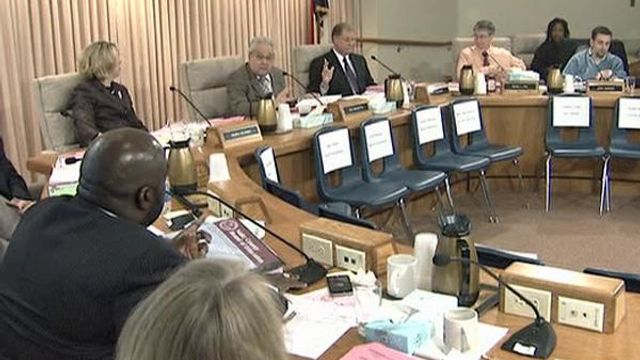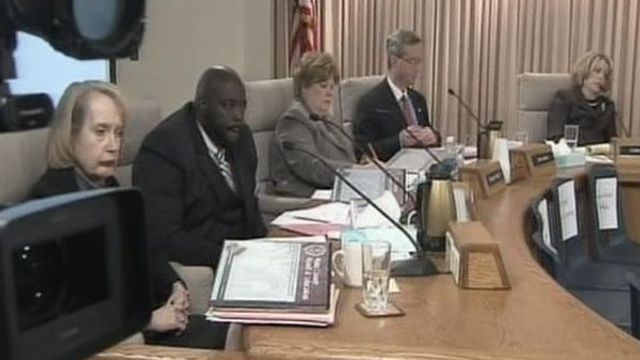Wake to end mandatory year-round schools
Adding to changes the new majority on the Wake County Board of Education has already made, members approved a resolution on Tuesday, ending mandatory year-round assignments beginning with the 2010-11 school year.
Posted — UpdatedChairman Ron Margiotta, and members Deborah Prickett, Chris Malone, Debra Goldman and John Tedesco voted in favor of the resolution, while members Carolyn Morrison, Keith Sutton, Kevin Hill and Anne McLaurin voted against it.
The resolution reads that “there will be no mandatory year-round assignments. Every effort will be made to accommodate families into the calendar of their choice, whether it is year-round or traditional, at a school within proximity of their residence. We will no longer deny calendar applications based on socio-economic status. We will use each and every seat efficiently."
Before the vote, McLaurin expressed concern that ending mandatory year-round schools would cause significant overcrowding and underutilization. Her points were those long voiced by district leaders who argued that mandatory year-round schools, which divides students into four groups and has them rotate on a schedule of nine weeks of class and a three-week break, are needed.
Two years ago, the district converted 22 elementary and middle schools to year-round schedules, and officials ordered all new schools to operate on that calendar. Administrators defended the controversial moves by saying it would help the district keep up with enrollment growth and save money on school construction since year-round schools can accommodate more students than traditional-calendar schools.
Opponents argue that year-round schools have not eased overcrowding and that they create a hardship for families.
"We already have mass-overcrowding," Tedesco said, adding that there is potential for capacity stabilization.
The new board majority had promised during their campaigns to end mandatory year-round assignments. They made good on that promise Tuesday with Goldman saying, "Let's give the people what they want."
"This is what people have been asking for. This why I had a 36-point swing in my district alone,” Malone said.
School Superintendent Del Burns could not comment Tuesday on what ending mandatory year-round schools would cost, or how the change would be implemented.
According to school administrators, there are 33,157 students in 42 year-round elementary schools. In nine year-round middle schools, there are 10,925 students. The schools are currently utilizing 85 percent of elementary seats and 91 percent of middle school seats.
The repercussions of guaranteeing those students a seat at a traditional-calendar school were unknown Tuesday among some school board members.
"The consequences of the decisions that were made tonight are unclear to all of us,” McLaurin said.
Following the year-round vote, the public was allowed to voice their opinions on the change. Among the concerns were the potential consequences of ending the year-round calendar.
"It is fiscally irresponsible of the board to vote on new resolutions without understanding the consequences," a person said.
"I think I have witnessed a dog-and-pony show at this meeting," another person told the board. "I am very worried about the future of this school system."
Some people at the meeting backed the school board's decision.
"I want to thank the newly-elected board members for hitting the ground running," a person said. "I like what you are doing."
The school board plans to conduct an online-only survey this month of parents to gauge the popularity of the year-round calendar.
The board will consider recommendations from the survey next month. A series of community meetings are also planned for February to gather additional feedback on school calendars.
Some board members argue that the year-round resolution also reverses the district diversity policy. They cite the portion of the resolution that reads, “We will no longer deny calendar applications based on socio-economic status.”
The newly-elected members have vowed to dismantle the district's policy of assigning students so that no school has more than 40 percent of its students receiving free or reduced-price lunches because they're from low-income families.
"This to me will be a fairer way of giving them the choice that they are desiring,” Prickett explained Tuesday.
"I think the intent of this was to reverse the diversity policy,” McLaurin added.
Opponents say ending the current plan of busing to balance socio-economic diversity could lead to re-segregation.
Board members were also scheduled to discuss the hiring of attorney Thomas Farr to prepare an audit in preparation for potential lawsuits related to the diversity policy. However, the item was removed from the agenda during the meeting. An attempt by Margiotta to put the item back on the agenda failed.
The board also voted Tuesday in favor of creating two committees:
- The Economically Disadvantaged Students Task Force would examine student discipline and suspensions, end-of-grade and end-of-course test scores and graduation rates.
- The Student Assignment Advisory Committee would look at current student assignment policies and offer recommendations about what future assignments should look like.
• Credits
Copyright 2024 by Capitol Broadcasting Company. All rights reserved. This material may not be published, broadcast, rewritten or redistributed.






